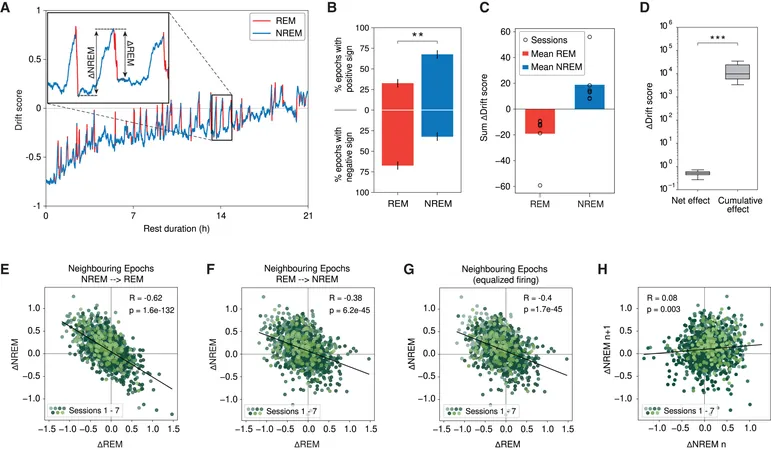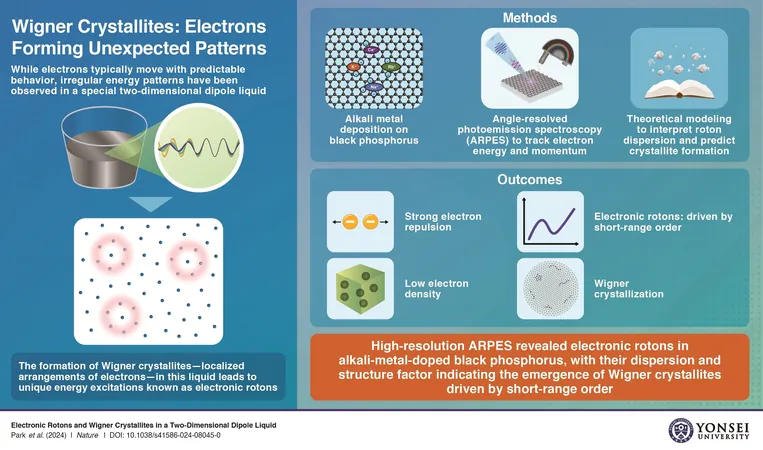
Unlocking the Secrets of Sleep: How a Good Night’s Rest Enhances Memory Retention
2025-03-24
Author: Daniel
Imagine waking up every day feeling sharper and more in tune with your thoughts. Recent research has unveiled an astonishing truth: a good night’s sleep not only refreshes our bodies but is also pivotal in solidifying our memories. Whether it’s remembering where you left your keys or recalling crucial information for a big meeting, sleep plays a vital role in sharpening our mental acuity. This phenomenon isn’t just confined to humans; animals, too, rely on their ability to retain spatial information for survival, like recalling the locations of food in their environment.
To delve deeper into this fascinating interplay between sleep and memory, a team of researchers led by Professor Jozsef Csicsvari at the Institute of Science and Technology Austria (ISTA) has been examining the neural activity patterns in rats during sleep. By employing advanced wireless technology, they monitored the brains of rats over extended periods of sleep—up to an unprecedented 20 hours—far surpassing previous studies, which only tracked shorter intervals.
"Our research demonstrated that during the early stages of sleep, specific neuronal assemblies still echo the spatial memories recently acquired by the rats," says Csicsvari. "However, as sleep progresses, these patterns begin to evolve, aligning more closely with the brain's activity when the rats awaken and successfully navigate to their food rewards." This groundbreaking study has been published in the prestigious journal, Neuron.
The Brain’s GPS: Hippocampus in Action
The hippocampus, a crucial area in the brain, acts as the cognitive map for navigating our surroundings. It’s responsible for both spatial learning and maintaining the pathways that lead to rewards. Neurons in this region activate at specific locations, contributing to an internal representation of the environment that accommodates updates from recent experiences—especially when food locations are involved.
Following the spatial learning tasks, the hippocampus is instrumental in enhancing memory retention during sleep by reactivating these newly stored memory traces. Previous studies by Csicsvari's team indicated that more frequent reactivation of a reward location during sleep correlates with better recall after waking. Conversely, preventing this reactivation led to difficulty in remembering these locations altogether.
The Mystery of Memory Enhancement Unraveled
While earlier experiments focused on short sleep periods, this recent study brought to light the dynamics of memory reactivation throughout longer sleep cycles. The researchers observed a fascinating phenomenon known as "representational drift." During sleep, the firing patterns of neurons associated with reward locations reorganized. Some neurons maintained activity throughout, dubbed a "stable subgroup," while others ceased firing as the sleep stage progressed, making way for new neuronal activity to emerge.
What Does This Mean for Memory Storage?
The researchers hypothesize that this drift might serve a crucial function. Csicsvari suggests, "Memory representations might be quickly formed during learning, but these initial formations could be suboptimal for long-term retention. Sleep may enhance or refine these representations, freeing up neural resources for new memories." Supporting this idea, the team noted a reduction in the number of neurons linked to specific reward locations post-sleep, indicating a potential reset that prepares the brain to absorb new information.
As discoveries continue to emerge from this line of research, we stand on the cusp of unlocking more mysteries regarding how sleep recharges our memories. This essential aspect of life may not just determine how well we rest, but may also hold the key to improving how we learn and retain information. So, the next time you consider sacrificing sleep for more work or study time, remember—sleep is not just downtime; it’s vital for keeping your memories fresh and your mind sharp!



 Brasil (PT)
Brasil (PT)
 Canada (EN)
Canada (EN)
 Chile (ES)
Chile (ES)
 Česko (CS)
Česko (CS)
 대한민국 (KO)
대한민국 (KO)
 España (ES)
España (ES)
 France (FR)
France (FR)
 Hong Kong (EN)
Hong Kong (EN)
 Italia (IT)
Italia (IT)
 日本 (JA)
日本 (JA)
 Magyarország (HU)
Magyarország (HU)
 Norge (NO)
Norge (NO)
 Polska (PL)
Polska (PL)
 Schweiz (DE)
Schweiz (DE)
 Singapore (EN)
Singapore (EN)
 Sverige (SV)
Sverige (SV)
 Suomi (FI)
Suomi (FI)
 Türkiye (TR)
Türkiye (TR)
 الإمارات العربية المتحدة (AR)
الإمارات العربية المتحدة (AR)